You need to reorganize the formula so that you don't have to calculate P(3) to calculate P(2). This is pretty easy to do, by bringing the last term of the summation, P(n+1)a(0), to the left side of the equation and dividing through by a(0). Then you have a formula for P(n+1) in terms of P(m) where m <= n, which is solvable by recursion.
As Bruce mentions, it's best to cache your intermediate results for P(n) by keeping them in a dict so that a) you don't have to recalculate P(2) etc everytime you need it, and b) after you get the value of P(n), you can just print the dict to see all the values of P(m) where m <= n.
import math
a_lambda = 1.0
rho = 0.8
c = 1.0
b = rho * c / a_lambda
p0 = (1 - (a_lambda*b))
p1 = (1-(a_lambda*b))*(math.exp(a_lambda*b) - 1)
p_dict = {0: p0, 1: p1}
def a(n):
return math.exp(-a_lambda*b) * ((a_lambda*b)**n) / math.factorial(n)
def get_nth_p(n, p_dict):
# return pre-calculated value if p(n) is already known
if n in p_dict:
return p_dict[n]
# Calculate p(n) using modified formula
p_n = ((get_nth_p(n-1, p_dict)
- (get_nth_p(0, p_dict) + get_nth_p(1, p_dict)) * a(n - 1)
- sum(get_nth_p(j, p_dict) * a(n + 1 - j) for j in xrange(2, n)))
/ a(0))
# Save computed value into the dict
p_dict[n] = p_n
return p_n
get_nth_p(6, p_dict)
print p_dict
Edit 2
Some cosmetic updates to the code - shortening the name and making p_dict a mutable default argument (something I try to use only sparingly) really makes the code much more readable:
import math
# Customary to distinguish variables that are unchanging by making them ALLCAP
A_LAMBDA = 1.0
RHO = 0.8
C = 1.0
B = RHO * C / A_LAMBDA
P0 = (1 - (A_LAMBDA*B))
P1 = (1-(A_LAMBDA*B))*(math.exp(A_LAMBDA*B) - 1)
p_value_cache = {0: P0, 1: P1}
def a(n):
return math.exp(-A_LAMBDA*B) * ((A_LAMBDA*B)**n) / math.factorial(n)
def p(n, p_dict=p_value_cache):
# return pre-calculated value if p(n) is already known
if n in p_dict:
return p_dict[n]
# Calculate p(n) using modified formula
p_n = ((p(n-1)
- (p(0) + p(1)) * a(n - 1)
- sum(p(j) * a(n + 1 - j) for j in xrange(2, n)))
/ a(0))
# Save computed value into the dict
p_dict[n] = p_n
return p_n
p(6)
print p_value_cache
 I wrote the code in Python as below:
I wrote the code in Python as below: